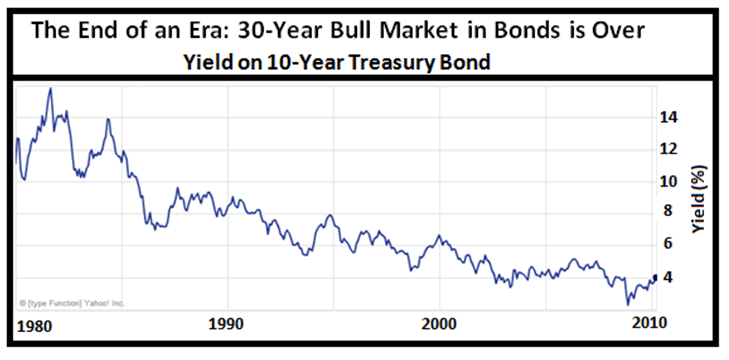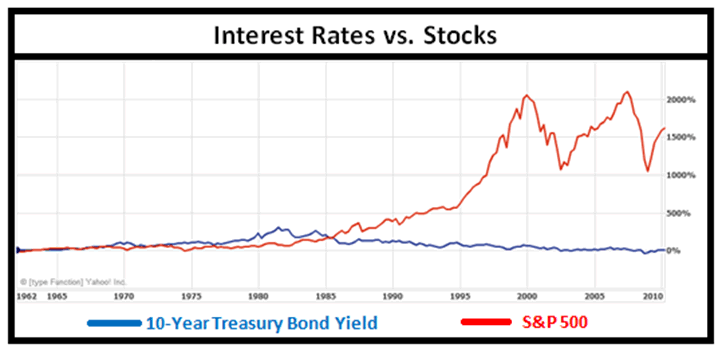These Two Market-Shaping Events Will Have an Untold Impact on Stocks
Stock-Markets / Stock Markets 2010 Apr 10, 2010 - 02:02 AM GMTBy: Q1_Publishing

 The current rally may have taken its last breath.
The current rally may have taken its last breath.
Last week two major events happened that will have a tremendous impact on your portfolio in the months and years ahead.
Last week, while the Dow continued its march higher and the mainstream financial media cheered on the rally, the most important market in the world took a major turn.
A few investors will be positioned to reap exceptional rewards while the herd will take a bigger hit to their bottom line than they did during the Panic of 2008.
Here’s what we at the Prosperity Dispatch consider the most important megatrend in the financial world, what it will mean for stocks, and how it may have taken a big turn last week.
The End of an Era Nears
It’s no secret the current rally has been built on the shaky foundation of money printing and low interest rates.
Interest rates have been artificially held down by the Fed. They’ve held short-term rates at the lowest level in the past century because they set them by fiat. They’ve held long-term rates low by purchasing hundreds of billions of dollars of government bonds and more than $1 trillion mortgage-backed securities (MBS).
That’s all about to change.
As for short-term rates, the Fed has already started signaled rates are going up.
The first catalyst is unemployment. Last Friday the U.S. released its latest unemployment figures. Although no one fully trusts the unemployment data with all the “seasonal adjustments” and accounting for temporary census workers involved, the reported gain of 162,000 new jobs was well-received.
Also, Thomas Hoenig, the President of the Federal Reserve Bank of Kansas City, said short-term rates must go up “soon.” Of course, ratcheting them up form near zero to 1%, the move Hoenig recommended, will leave short-term rates far below historical norms.
Long-term rates, which are driven by the open market, only have one way to go – UP.
The chart below shows a 30-year bull market in bonds (bond prices go up and interest rates go down) has already peaked:

The increase in long-term rates will only be exacerbated by the Fed officially ending its MBS buying spree.
Although most of the media will never pay much attention until it’s too late, rate increases should be of paramount concern to investors.
Interest Rates vs. Stocks: The Winner Is…
Investors should be watching interest rates because they have a huge impact on stocks.
The chart below shows how interest rates have affected stock prices over the past five decades:

The swings in interest rates may be relatively small, but they have a big impact.
For example, the 1970s bear market was largely due to rising rates. Between 1964 and 1982 the yield on the 10-Year U.S. Treasury bond rose from 4.23% to 14.44%. The S&P 500 meanwhile returned a mere 42% over the entire 18-year period.
The inverse is also true. The bull market kicked off in 1982 watched the S&P 500 climb from 112 to 1169 in 2010 – a total return of 944%. Over that same period the yield on the 10-Year U.S. Treasury bond fell from 14.44% to 3.83%.
The breakdown of the periods of rising and falling rates shows the full picture:

Right now, rates are back at their lows in the early 1960s. Is there any reason to expect the results to be any different?
Nowhere to Earn
At this point, it seems like no one is paying attention to interest rates. It makes perfect sense too.
With rates sitting just off generational lows, there’s not much to get excited about. Government bonds pay next to nothing (0.44% for one-year T-bill and 3.86% for 10-year T-bonds). The national average for a five-year bank CD is a mere 2.85%. Investment-grade corporate bonds are yielding 4% to 6%.
Lending isn’t paying much and potential bond buyers are forced to turn elsewhere for returns.
Since this rally has begun, they’ve turned largely to stocks. And that’s why low rates have sparked one of the most prolific rebounds in stocks.
Is The Rally Really Over?
Right now, there’s no reason to expect this trend to reverse. Sure, stocks are overvalued. Commodities have had fantastic runs. And the highs are getting a little too high. But with rates still very, very low, there’s no telling how much higher stocks and commodities can go.
However, as rates start to rise, the impacts will be witnessed far and wide.
Stocks, as a whole, won’t deliver nearly the returns they have over the past three decades.
Bonds, the investment class that attracted the most new capital in 2009, will be fall (bond prices go down when interest rates go up).
And real estate could be the hardest hit of all. Remember when we looked at when housing prices will bottom a few weeks ago? If so, you’ll recall how a 3% rise in interest rates could easily push housing prices down another 40%.
Rising rates will be very bad news for the economy, stocks, bonds, and real estate. Add to that aging demographics of the United States where pension funds and investors will sell stocks to fund their retirements and excessive government borrowing that will only hasten rate increases, and you’re looking at a pretty bad situation when this bubble bursts.
That’s why we continue to believe the current “Great Reflation” will not last and we’ll keep a close eye on interest rates to see when it will really start to happen.
Despite it all, no one is really talking about rising rates. Last week, however, was an important week foretelling the future rise in interest rates. But history will likely look back on rising rates as the starting point for the resumption of a long bear market.
As rates continue to rise, we’ll know when the current rally has taken its last breath. In the next Prosperity Dispatch, we’ll look at what to do now to protect your assets from the rising rate megatrend and how to squeeze every last drop out of potential gains from the current rally.
Until then, good investing,
Good investing,
Andrew Mickey
Chief Investment Strategist, Q1 Publishing
Disclosure: Author currently holds a long position in Silvercorp Metals (SVM), physical silver, and no position in any of the other companies mentioned.
Q1 Publishing is committed to providing investors with well-researched, level-headed, no-nonsense, analysis and investment advice that will allow you to secure enduring wealth and independence.
© 2010 Copyright Q1 Publishing - All Rights Reserved
Disclaimer: The above is a matter of opinion provided for general information purposes only and is not intended as investment advice. Information and analysis above are derived from sources and utilising methods believed to be reliable, but we cannot accept responsibility for any losses you may incur as a result of this analysis. Individuals should consult with their personal financial advisors.
© 2005-2022 http://www.MarketOracle.co.uk - The Market Oracle is a FREE Daily Financial Markets Analysis & Forecasting online publication.


